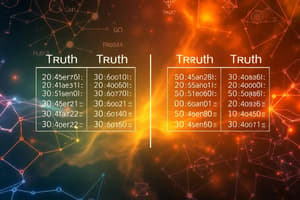Podcast
Questions and Answers
What are truth tables used for in logic?
What are truth tables used for in logic?
To represent and analyze logical relationships
How are truth values represented in a truth table?
How are truth values represented in a truth table?
'T' for True and 'F' for False
What do rows in a truth table represent?
What do rows in a truth table represent?
All possible combinations of truth values for the propositions
Why are truth tables important in logic?
Why are truth tables important in logic?
How do truth tables help in logical reasoning?
How do truth tables help in logical reasoning?
What is the truth value of 'A ∧ B' when A is false and B is true?
What is the truth value of 'A ∧ B' when A is false and B is true?
Explain the truth value of 'A ∨ B' when A is true and B is false.
Explain the truth value of 'A ∨ B' when A is true and B is false.
What is the truth value of '¬A' when A is true?
What is the truth value of '¬A' when A is true?
Evaluate the expression 'A ∧ (B ∨ C)' when A is true, B is false, and C is true.
Evaluate the expression 'A ∧ (B ∨ C)' when A is true, B is false, and C is true.
What are 3 applications of truth tables mentioned in the text?
What are 3 applications of truth tables mentioned in the text?
Flashcards are hidden until you start studying
Study Notes
Logic and Truth Tables
Logic, a cornerstone of critical thinking and problem-solving, is the study of how information is structured, evaluated, and manipulated to draw conclusions. At the core of logical reasoning are truth tables, which serve as a formal and systematic way to represent and analyze logical relationships.
Truth Tables: A Primer
Truth tables are visual representations of the relationships between propositions and their corresponding truth values. They are presented as tables with columns for each proposition and rows that represent all possible combinations of truth values for those propositions.
The truth table for a single proposition (A) would look like this:
| A |
|---|
| T |
| F |
Here, 'T' represents 'True' and 'F' represents 'False'.
As logical expressions become more complex, involving multiple propositions and connectives like 'and', 'or', and 'not', truth tables provide a clear and unambiguous means of determining the truth value of a compound proposition.
Truth Tables for Basic Connectives
Consider the connectives 'and' and 'or'. The truth table for 'and' (denoted as '∧') looks like this:
| A | B | A ∧ B |
|---|---|---|
| T | T | T |
| T | F | F |
| F | T | F |
| F | F | F |
The 'or' connective (denoted as '∨') has the following truth table:
| A | B | A ∨ B |
|---|---|---|
| T | T | T |
| T | F | T |
| F | T | T |
| F | F | F |
The truth table for 'not' (denoted as '¬') is straightforward:
| A | ¬A |
|---|---|
| T | F |
| F | T |
Truth Tables for More Complex Expressions
As the complexity of logical expressions grows, so too does the size of the truth tables. For example, the truth table for 'A ∧ (B ∨ C)' (which represents 'A and (B or C)') would be:
| A | B | C | A ∧ (B ∨ C) |
|---|---|---|---|
| T | T | T | T |
| T | T | F | T |
| T | F | T | T |
| T | F | F | F |
| F | T | T | F |
| F | T | F | F |
| F | F | T | F |
| F | F | F | F |
Applications of Truth Tables
Truth tables provide a systematic and reliable method for analyzing logical expressions. They are particularly useful in:
- Confirming the validity of logical arguments.
- Identifying the truth values of compound propositions.
- Determining the behavior of logical circuits and programs.
- Evaluating the logical equivalence of expressions.
- Constructing and analyzing logical proofs.
Through truth tables, we can understand the relationships between propositions, identify logical fallacies, and develop a strong foundation in logical thinking. With this understanding, we can approach more complex problems with confidence and precision, knowing that our conclusions are based on sound logical principles.
Studying That Suits You
Use AI to generate personalized quizzes and flashcards to suit your learning preferences.




